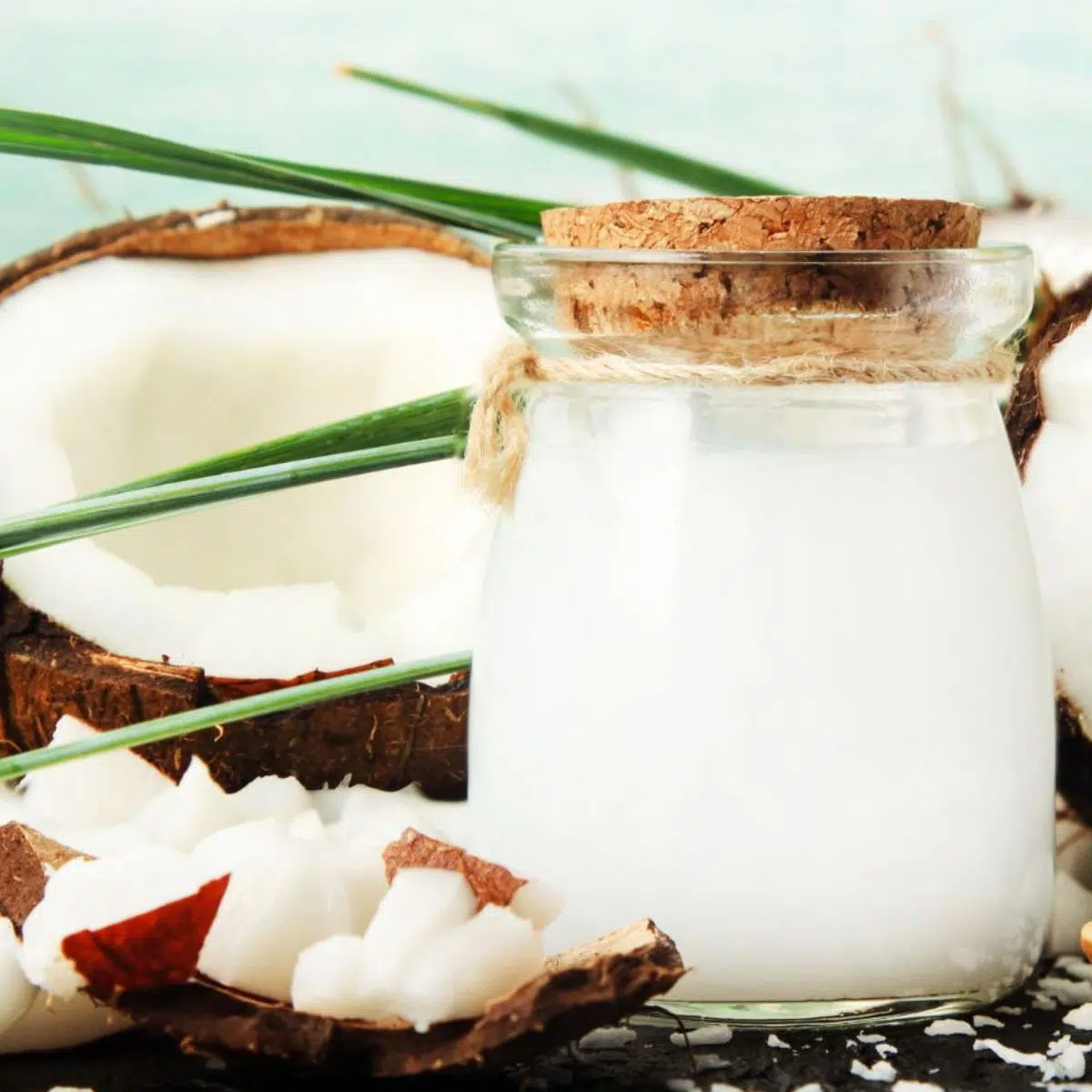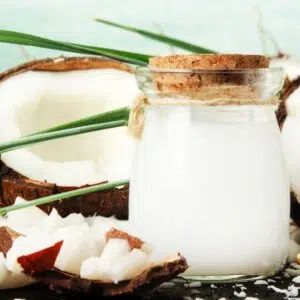Finding a good substitute for coconut oil is easy. I've got a bunch of choices that are great for cooking and baking! If you're allergic to coconut, don't have any coconut oil, or just don't like how it tastes, there are plenty of other things you can use instead. Check out this list to see what other options you have for replacing coconut oil.
Try out these coconut oil substitutes in my creamy coconut shrimp, pumpkin bars, Mississippi mud pie, or raspberry white chocolate muffins.

Jump to:
- Best Substitutes for Coconut Oil
- 1. Extra Virgin Olive Oil
- 2. Butter
- 3. Lard
- 4. Beef Tallow
- 5. Canola Oil
- 6. Sunflower Oil
- 7. Avocado Oil
- 8. Almond Oil
- 9. Grapeseed Oil
- 10. Applesauce
- 11. Cooking spray
- Other Coconut Oil Substitutes
- 12. Hazelnut Oil
- 13. Hempseed Oil
- 14. Refined Peanut Oil
- 15. Safflower Oil
- 16. Shea Butter
- 17. Neem Oil
- 📖 Recipe Card
- 💬 Comments & Reviews
Coconuts have become quite popular in recent years. When it comes to substitutes, coconut products are at the top of the list of best options. Need to make a dairy-free drink or dessert? Reach for coconut milk. Making a gluten-free or low-carb treat? Grab a bag of coconut flour!
In addition to coconut flour, coconut milk, and coconut cream, coconut oil has risen in popularity. It's often used as a substitute for other ingredients, but sometimes you may need a substitute for the coconut oil itself. Thankfully, you have options!
Best Substitutes for Coconut Oil
When it comes to finding the best substitute, you want something that will provide a similar flavor and texture. Unfortunately, no substitute has the same flavor as coconut oil.
Fortunately, there are several that have the same consistency! Moreover, almost all these wonderful substitutes can be used in both cooking and baking.
1. Extra Virgin Olive Oil
Long before coconut oil became popular, olive oil was the healthy fat of choice. In fact, many cooks started swapping out their olive oil for coconut oil.
With a similar consistency and cooking properties, it is an easy substitute. However, olive oil has the same issue that some find with coconut oil. Its taste.
Olive oil has a mild but distinct flavor. This flavor enhances the savory taste of many recipes, though. It can even be used for a savory take on baked goods - like a lemon cake. It is also an excellent substitute for dressings and marinades.
Use in a 1:1 ratio for coconut oil in any recipe.
2. Butter
Before olive oil and coconut oil - butter was the go-to! Butter is an amazing fat for both baking and cooking when you want to enrich the flavor. Who doesn't love that rich buttery taste?
Moreover, butter helps enrich the creamy texture of sauces. It also elevates the texture of baked goods by adding moisture.
Butter is also a great substitute for coconut oil because it can be used in the same solid or liquid form. Replace coconut oil with a 1:1 ratio of butter.
*Keep in mind that butter has a higher water content than other oil replacements; you may get a slightly different texture when cooking with butter vs coconut oil.
3. Lard
The authentic original in cooking fat is lard. Before butter, oil, and shortening, lard was the main choice for cooking, roasting, frying, and baking!
While it has diminished in popularity, it is still one of the best all-around cooking fats. Its neutral taste makes it easy to use as a substitute in any recipe. Like butter, it can also be used to replace coconut oil in a solid or liquid form.
Use lard in a 1:1 ratio for coconut oil in cooking and baking.
4. Beef Tallow
Beef tallow is like lard except that the fat is derived from cows instead of pigs. Although it comes from a different animal, beef tallow has the same properties as lard.
It has a neutral flavor that can be used in cooking and baking. Moreover, it has a high smoke point for frying. However, it will not lend itself to being used in dressings or marinades.
It can be used in solid form or melted in a 1:1 ratio for coconut oil.
5. Canola Oil
Canola (or vegetable oil) is an easy substitute that many people have at home. Compared to coconut oil, it is also an inexpensive alternative.
Canola oil has a neutral flavor that is ideal as a substitute. It won't add a new flavor or overpower any other flavors in the recipe. It also has a high smoke point, making it ideal for baking, roasting, sauteing, and frying.
You can use this as a simple 1:1 substitution for coconut oil in any recipe.
6. Sunflower Oil
If you want a neutral oil that is not derived from corn, then give sunflower oil a try. This oil is made from sunflower seeds and has a mild flavor that is great for cooking. With a high smoke point, it can also be used for frying.
Beyond being a great choice for savory dishes, you can also use sunflower oil for baking. It is particularly great for less sweet baked goods, like quick breads and muffins.
Replace coconut oil with a 1:1 ratio of sunflower oil.
>>>See All Of My Recipes Here!<<<
7. Avocado Oil
Avocados are a sneaky substitute. These creamy green superfoods are great for replacing fat in baking. It's not just fresh avocado that is a great substitute, though.
Avocado oil is a wonderful choice! The mild flavor of avocado oil is a great substitute for cooking and baking (at medium heat). It also provides a lovely base for salad dressings and marinades.
Use in an easy 1:1 swap for coconut oil.
8. Almond Oil
Almonds are another food that has been adapted for various forms of cooking. Like coconuts, you can find almond milk and almond flour. You can also find almond oil!
Like coconut oil, almond oil has its own distinct flavor. This nutty flavor is great for adding a hint of almond flavor to baked goods. It can also enrich the savory elements in cooking.
Beyond the basics of cooking and baking, almond oil can be used in dressings and even for frying.
Swap out coconut oil with almond oil in a 1:1 ratio.
9. Grapeseed Oil
Grapeseed oil is making a name for itself in the world of healthy fats. Derived from the residue of grapes that have been juiced, it is a wonderful natural oil.
Even though it comes from grapes, it is not sweet. It has a mild flavor that is wonderful at taking on the other flavors around it. Therefore, it works well for dressings, marinades, baking, and cooking.
Replace the coconut oil in your recipe with an equal 1:1 ratio of grapeseed oil.
10. Applesauce
Applesauce is commonly used as a substitute for butter baking. Because of this, it can be used to replace any other fat - like coconut oil - in baking.
It will add a lot of moisture to any of your favorite recipes (that would work well with a subtle apple flavor). However, applesauce is a fat-free ingredient, which could change the final texture of your baked goods, causing them to become more dense.
Due to the difference in consistency between coconut oil and applesauce, start with ¼ less than the recipe calls for (¾ cup of applesauce in place of 1 cup of coconut oil).
If the dough or batter does not look thin enough, add the additional ¼ measurement.
11. Cooking spray
While you can't use applesauce for fat-free cooking, you can use cooking spray! Your favorite cooking spray is a great fat-free alternative to coconut oil for sautéing or roasting.
All you need to do is spray the skillet and add your veggies and meat. When roasting, place your vegetables or meat on a baking sheet and then spray the veggies and meat with the cooking spray. Toss or stir them to coat before placing them in the oven.
Other Coconut Oil Substitutes
The great thing about coconut oil is that you can substitute it with any oil! In addition to the substitutes above, any of these additional oils can be used.
12. Hazelnut Oil
Great for baking if you want to add a soft, nutty flavor to your recipe. It can also be used in cooking or even for dressings if the nutty flavor pairs well with the other ingredients. Use in a 1:1 ratio.
13. Hempseed Oil
Hempseed oil has a distinct taste that is both earthy and nutty. It provides a nice flavor change to salad dressings, sauces, and marinades. It can be used in a 1:1 ratio, but you may want to begin with less - depending on flavor preference.
14. Refined Peanut Oil
Good for frying, this oil was popularly used in fast food; however, it is no longer widely used due to the rise in peanut allergies. In addition to frying, it can be used in a 1:1 ratio for regular cooking and baking.
15. Safflower Oil
Safflower oil has a high smoke point and is popular in restaurants. Its neutral flavor is great for baking, roasting, and frying. Use a 1:1 ratio of safflower oil in place of coconut oil.
16. Shea Butter
You may have heard of shea butter before but as an ingredient in many different types of skincare. Did you know that it can also be used in baking and cooking? Due to the flavor, I recommend only using it for baked goods, but feel free to experiment with other recipes, too.
Start with half of what the recipe calls for and add more if desired.
17. Neem Oil
Neem oil is popular in India, but other areas of the world typically use it in gardening. If you didn't know, it can also be used for skin care as well as cooking! However, it does have a somewhat bitter flavor that not everyone will like.
Start with a small amount and add more if needed.
I hope this list of coconut oil substitutes can help you out in the kitchen. Let me know in the comments below which one your favorite is.
Do you love a recipe you tried? Please leave a 5-star 🌟rating in the recipe card below and/or a review in the comments section further down the page.
Stay in touch with me through social media @ Pinterest, Facebook, Instagram, or Twitter! Subscribe to the newsletter today (no spam, I promise)! Don't forget to tag me when you try one of my recipes!
📖 Recipe Card
Coconut Oil Substitute
Ingredients
- 1 tablespoon olive oil (extra virgin)
- 1 tablespoon butter
- 1 tablespoon lard
- 1 tablespoon tallow
(Note: 2x or 3x only changes the ingredient list)
Instructions
- Use extra virgin 1 tablespoon olive oil, 1 tablespoon butter, 1 tablespoon lard, or 1 tablespoon tallow in an equal 1:1 ratio to substitute for coconut oil in any recipe. Olive oil and butter are best for baking, and tallow is exceptional for cooking.
- Other cooking oils can also be used very successfully, depending on what you have in the pantry and/or your recipe. Consider the desired flavor of your end result when picking one of these handy options.
- The alternatives mentioned include Extra Virgin Olive Oil, Butter, Lard, Beef Tallow, Canola Oil, Sunflower Oil, Avocado Oil, Almond Oil, Grapeseed Oil, Applesauce, Cooking Spray, Hazelnut Oil, Hempseed Oil, Refined Peanut Oil, Safflower Oil, Shea Butter, and Neem Oil.



Kim says
I'm allergic to coconuts, and so many recipes now call for coconut oil. Thanks for posting this list and giving info such! as smoke point and flavor. Very helpful.